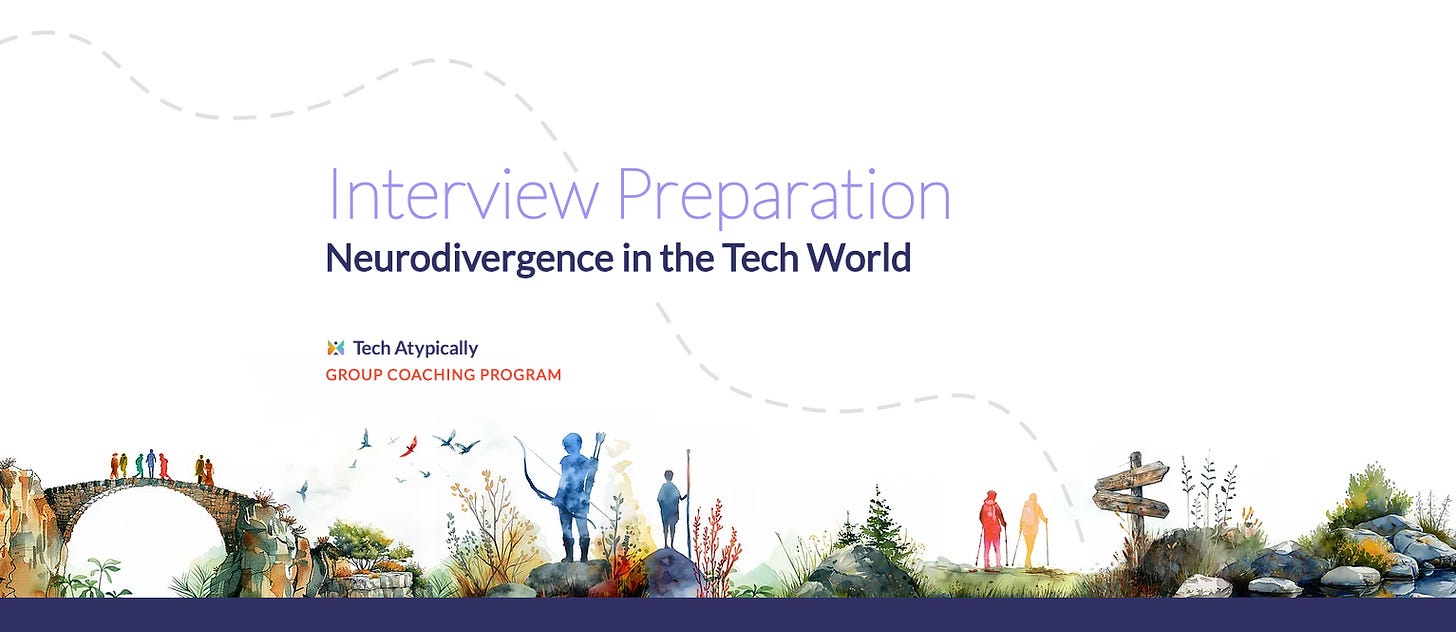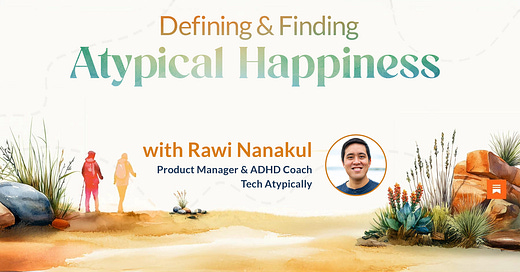
#84🌟 Believing in Yourself as Much as You Believe in Others
The power of being proud of yourself and others.
Welcome to Tech Atypically 👋, your weekly blog for navigating the challenges of ADHD and being in the tech industry.
I am an ADHD and product management coach helping you change one belief and take one action each week.
🐼Feeling alone in your job search? Join a community of people just like led by 3 experts to help you find your next job.
Part 10 of the Self-Care Series
🦋The Takeaways
Belief: I can believe in others more than I believe in myself.
Reality: You can only support others with the strength you have in yourself.
Action: Tell yourself and others how proud you are of them.
⭐️Introduction
One gift of neurodiversity is your ability to believe in others far more than yourself. You're often the first to offer colleagues and friends encouragement, support, and validation. You're a ride-or-die supporter. But when it comes to yourself? You question whether you're worthy of anything.
This week, we discuss how the phrase "I'm so proud of you" can change how you feel about yourself and others around you.
😵💫The Belief – I'm better at believing in others than in myself
Imagine this: You're in a team meeting, and a colleague shares an idea they're unsure about. You immediately see its potential and enthusiastically support it. But when it's your turn to present, your inner critic kicks in, and you downplay your ideas or contributions.
This disparity between how you view others and yourself is common among those with ADHD. You cheerleader others while being your harshest critic. Your ability to hyperfocus on details can make you excellent at spotting potential in others, but it can also amplify your self-doubt when you turn that focus inward.
Looking inward can be difficult when you have an emotional dysregulation disorder like ADHD. Self-reflection could mean feeling everything you've been trying to avoid processing. It could mean opening the box you've shoved your feelings into. You don't know what's in there, but you know it's going to explode. So you bury the feelings and box as deeply as you can.
You look externally to cheer others on in hopes that it'll be enough to keep the box of fear, pain, shame, imposter syndrome, self-doubt, and whatever else you've got from opening.
In short, the box creates a barrier between the confidence you have in others and the confidence you have in yourself.
🤝The Reality – Your self-belief is the foundation for supporting others
The strength of your support for others is directly tied to the strength of your belief in yourself. It's like the safety instructions on an airplane - you need to put on your own oxygen mask before you can help others.
When you truly believe in yourself, you're not just more confident in your abilities; you're also better equipped to lift others. Your encouragement comes from a place of genuine strength and experience, rather than a place of comparison or compensation for your own perceived shortcomings. Your support is more authentic because it comes from a place of strength instead of avoidance.
By believing in yourself, you invite others to do the same. Your authenticity is an invitation for others to believe in themselves, to share how they truly feel and who they truly are. This is particularly important in the neurodivergent community, where most of us have spent most of our lives trying to live up to being or projecting something we aren't.
By openly sharing my struggles and successes, I invite both myself and you to believe more deeply in our own potential. It comes from a place of authenticity and empowerment. I still use the box to avoid my feelings, but it's gotten smaller over the years as I've learned to believe in myself more.
🛠️The Action – Cultivate self-belief through recognition and affirmation
Tell yourself and others how proud you are. - Make it a habit to vocalize pride - both in yourself and in others. Say "I'm proud of myself for..." and "I'm proud of you for..." regularly. This reinforces self-belief and strengthens your connections with others by creating an invitation for everyone to believe in themselves more.
Recognize that ease doesn't diminish achievement. - What's effortless for you might be challenging for others. Your role leverages your unique strengths, making certain tasks feel "easy". What matters is the impact you deliver and how you help others.
Start a "proud moments" journal. - At the end of each day, write down one thing you're proud of accomplishing. It doesn't have to be big - maybe you spoke up in a meeting or figured out a tricky bug. The goal is to train your brain to recognize your own successes.
This also works great at work as you can reference this for performance reviews. Having the list avoids the challenge of “WTF did I deliver this year?”.
Practice self-affirmations. - It might feel awkward at first, but speaking positively to yourself can have a powerful impact. Try starting your day by looking in the mirror and saying, I do enough, I have enough, I am enough."
Share your accomplishments. - When you achieve something, no matter how small, share it with a trusted friend or colleague. Vocalizing your successes makes them more real and helps combat imposter syndrome.
Celebrate others' successes. - and your role in them. - When someone you've supported succeeds, celebrate not just their achievement, but also your contribution to their success. Recognize that your belief in them played a part.
✨Conclusion
Believing in yourself isn't just about boosting your confidence - it's about amplifying your ability to make a positive impact on those around you. As a neurodiverse professional, you have unique gifts that allow you to see and nurture potential in others. By turning that same belief inward, you can reduce your reliance on shoving your feelings into the box of emotional avoidance and build resilience in believing in yourself.
I’m proud of you for reading this far. And I’m proud of myself for taking the time to reflect.
🐼Join other tech professionals learning how to thrive at work with their neurodiversity.
⏭️Next Week
Not sure because I have 3 different guest posts that could be published next week.















